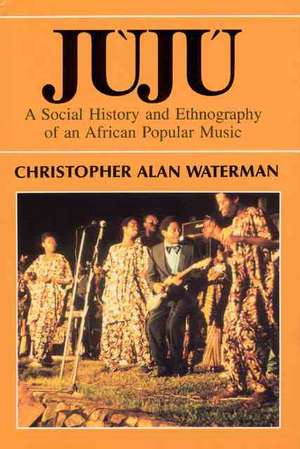Juju: A Social History and Ethnography of an African Popular Music: Chicago Studies in Ethnomusicology
Autor Christopher Alan Watermanen Limba Engleză Paperback – 31 mai 1990
Now known internationally through the recordings of King Sunny Ade and others, juju music originated more than fifty years ago among the Yoruba of Nigeria. This history and ethnography of juju is the first detailed account of the evolution and social significance of a West African popular music. Enhanced with maps, color photographs of musicians and dance parties, musical transcriptions, interviews with musicians, and a glossary of Yoruba terms, Juju is an invaluable contribution to scholarship and a boon to fans who want to discover the roots of this vibrant music.
Din seria Chicago Studies in Ethnomusicology
-
 Preț: 215.23 lei
Preț: 215.23 lei -
 Preț: 266.53 lei
Preț: 266.53 lei -
 Preț: 240.23 lei
Preț: 240.23 lei - 8%
 Preț: 564.74 lei
Preț: 564.74 lei -
 Preț: 184.64 lei
Preț: 184.64 lei -
 Preț: 103.15 lei
Preț: 103.15 lei -
 Preț: 200.20 lei
Preț: 200.20 lei -
 Preț: 214.61 lei
Preț: 214.61 lei -
 Preț: 185.07 lei
Preț: 185.07 lei -
 Preț: 184.18 lei
Preț: 184.18 lei -
 Preț: 185.14 lei
Preț: 185.14 lei -
 Preț: 207.69 lei
Preț: 207.69 lei -
 Preț: 390.87 lei
Preț: 390.87 lei - 23%
 Preț: 674.84 lei
Preț: 674.84 lei -
 Preț: 410.90 lei
Preț: 410.90 lei -
 Preț: 374.70 lei
Preț: 374.70 lei -
 Preț: 346.67 lei
Preț: 346.67 lei -
 Preț: 352.99 lei
Preț: 352.99 lei -
 Preț: 292.28 lei
Preț: 292.28 lei -
 Preț: 253.52 lei
Preț: 253.52 lei -
 Preț: 265.30 lei
Preț: 265.30 lei -
 Preț: 442.31 lei
Preț: 442.31 lei -
 Preț: 287.83 lei
Preț: 287.83 lei -
 Preț: 258.91 lei
Preț: 258.91 lei -
 Preț: 253.44 lei
Preț: 253.44 lei -
 Preț: 267.65 lei
Preț: 267.65 lei -
 Preț: 277.69 lei
Preț: 277.69 lei -
 Preț: 261.54 lei
Preț: 261.54 lei -
 Preț: 292.67 lei
Preț: 292.67 lei -
 Preț: 295.18 lei
Preț: 295.18 lei -
 Preț: 225.49 lei
Preț: 225.49 lei -
 Preț: 294.19 lei
Preț: 294.19 lei -
 Preț: 293.66 lei
Preț: 293.66 lei -
 Preț: 264.16 lei
Preț: 264.16 lei -
 Preț: 290.55 lei
Preț: 290.55 lei -
 Preț: 384.13 lei
Preț: 384.13 lei -
 Preț: 235.63 lei
Preț: 235.63 lei -
 Preț: 321.95 lei
Preț: 321.95 lei -
 Preț: 299.96 lei
Preț: 299.96 lei -
 Preț: 367.37 lei
Preț: 367.37 lei -
 Preț: 323.69 lei
Preț: 323.69 lei
Preț: 199.02 lei
Preț vechi: 230.39 lei
-14% Nou
Puncte Express: 299
Preț estimativ în valută:
38.08€ • 40.72$ • 31.75£
38.08€ • 40.72$ • 31.75£
Carte indisponibilă temporar
Doresc să fiu notificat când acest titlu va fi disponibil:
Se trimite...
Preluare comenzi: 021 569.72.76
Specificații
ISBN-13: 9780226874654
ISBN-10: 0226874656
Pagini: 285
Ilustrații: 4 color plates, 24 halftones, 18 musical examples, 4 maps
Dimensiuni: 152 x 229 x 18 mm
Greutate: 0.41 kg
Ediția:1
Editura: University of Chicago Press
Colecția University of Chicago Press
Seria Chicago Studies in Ethnomusicology
ISBN-10: 0226874656
Pagini: 285
Ilustrații: 4 color plates, 24 halftones, 18 musical examples, 4 maps
Dimensiuni: 152 x 229 x 18 mm
Greutate: 0.41 kg
Ediția:1
Editura: University of Chicago Press
Colecția University of Chicago Press
Seria Chicago Studies in Ethnomusicology
Cuprins
Acknowledgments
Technical Notes
1. Introduction
2. Sákárà, Asíkò, Highlife, and Palmwine: Lagosian Popular Music between the World Wars
3. Early Jùjú Music (1932-1948)
4. The Development of Modern Jùjú (1948-1982)
5. The Social Organization and Contexts of Jùjú Performance in Ibadan
6. The Aesthetics and Social Dynamics of Jùjú Performance at the Yoruba àríyá
7. Jùjú Music and Inequality in Modern Yoruba Society
Appendix: Roster of Ibadan-Based Jùjú and Fuji Bands
Notes
Glossary of Yoruba Terms
Bibliography
Index
Technical Notes
1. Introduction
2. Sákárà, Asíkò, Highlife, and Palmwine: Lagosian Popular Music between the World Wars
3. Early Jùjú Music (1932-1948)
4. The Development of Modern Jùjú (1948-1982)
5. The Social Organization and Contexts of Jùjú Performance in Ibadan
6. The Aesthetics and Social Dynamics of Jùjú Performance at the Yoruba àríyá
7. Jùjú Music and Inequality in Modern Yoruba Society
Appendix: Roster of Ibadan-Based Jùjú and Fuji Bands
Notes
Glossary of Yoruba Terms
Bibliography
Index
Recenzii
"What's most impressive about Juju is how much Waterman makes of his purism. By concentrating on one long- lived, well-defined genre, he helps the Western reader experience 'rock' the way any proud Yoruba would—as a tributary of African music rather than vice versa."
